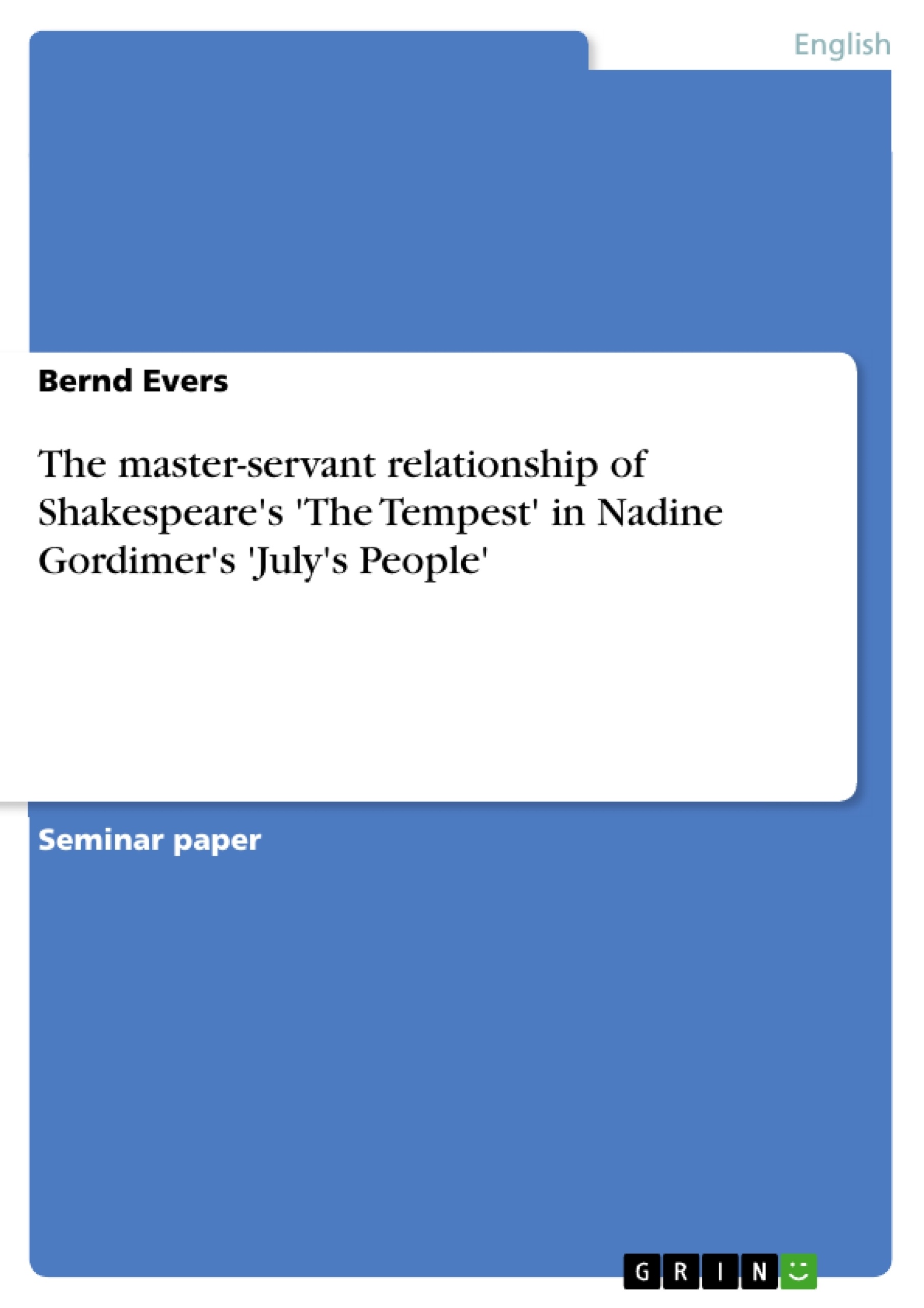Already in 1611 William Shakespeare argued in his romance “The Tempest” with the conquest of the New World. A wide space in this play is fulfilled by the analysis of the relationship between the European imperialist and the submissive native, shown by the example of Prospero, the rightful duke of Milan, and the creature Caliban, the “savage and deformed slave”.
Nearly 400 years later, in 1982, the South African author Nadine Gordimer deals with the situation of the abused slave in her novel “July’s People” again. She creates a fictional situation where the former white-coloured masters have lost their power after a successful revolution of the suppressed black majority. The white middle-class-family the Smales become themselves slaves as they are from now on dependent from their servant July, who offers them a refuge in his homeland.
In the upcoming analysis I want to show that Nadine Gordimer created a situation which can be seen as “If Caliban’s wish came true...”, as she continues the attempt of the slave to recover his liberty.
I want to compare both novels in order to prove that Gordimer orientated herself very much on Shakespeare’s play and makes use of typical characteristics of the master and the slave we find in “there. Her work should be regarded on the one hand as continuation and on the other hand as a lean on “The Tempest”.
Inhaltsverzeichnis (Table of Contents)
- Introduction
- The object of analysis
- The way of analysis
- If Caliban's wish came true -
The master-servant relationship of Shakespeare's “The Tempest” in Nadine
Gordimer's “July's People”
- How the stranger is presented
- The wild man Caliban in "The Tempest"
- The wild man July
- The imperialist in both works
- How the masters are presented
- Why do the masters want to control ?
- Why were the masters accepted at the beginning and are later fought on?
- The master as educator
- Two attempts to become free
- If a dream comes true...
- How the slave deals with new power
- Prospero's nightmare: the arrogance of the white man
- How the stranger is presented
- Conclusion
Zielsetzung und Themenschwerpunkte (Objectives and Key Themes)
This analysis aims to explore the master-servant relationship in Shakespeare's "The Tempest" and its continuation in Nadine Gordimer's "July's People". The paper focuses on the theme of power dynamics and how they are reflected through the relationship between the colonizer and the colonized. Specifically, it examines the perspectives of the colonized, using Caliban from "The Tempest" and July from "July's People" as examples. By comparing the two works, the paper highlights how Gordimer's novel can be seen as a continuation of Shakespeare's themes, offering a different perspective on the consequences of colonial power.
- The portrayal of the "Other" in both works.
- The relationship between the colonizer and the colonized.
- The consequences of colonial power and its impact on both the colonizer and the colonized.
- The desire for freedom and the struggle for power.
- The role of education and its impact on the master-servant dynamic.
Zusammenfassung der Kapitel (Chapter Summaries)
The introduction sets the stage for the analysis by outlining the objectives and methodology. It introduces both "The Tempest" and "July's People" and establishes the central theme of the master-servant relationship in a colonial context.
The first chapter delves into the portrayal of the “Other” in both works. It focuses on the characters of Caliban in "The Tempest" and July in "July's People," highlighting their representations as “wild” and “savage.” The chapter examines how these representations reflect societal prejudices towards the colonized.
The second chapter explores the characterization of the colonizer in both works. It compares Prospero from "The Tempest" and the Smales family from "July's People," focusing on their motivations for control and the consequences of their actions.
The third chapter examines the attempts of the colonized to gain freedom and create a new order in their homeland. It analyzes Caliban's rebellion in "The Tempest" and July's role in "July's People," exploring the potential for change and the challenges faced by the formerly colonized.
Schlüsselwörter (Keywords)
This analysis explores key concepts and themes related to colonialism, power dynamics, and the representation of the "Other". It focuses on the relationship between the colonizer and the colonized, drawing on examples from Shakespeare's "The Tempest" and Nadine Gordimer's "July's People." Key terms include master-servant relationships, colonialism, post-colonialism, power dynamics, the "Other", representation, and freedom.
Frequently Asked Questions
How does Nadine Gordimer's "July's People" relate to Shakespeare's "The Tempest"?
Gordimer's novel can be seen as a continuation of "The Tempest," exploring what happens when the "slave" (Caliban/July) gains power over the "master" (Prospero/the Smales) after a revolution.
Who represents the "Other" in these works?
In "The Tempest," it is Caliban, the "savage slave." In "July's People," it is July, the servant who provides refuge to his former masters in his homeland.
What are the power dynamics in "July's People"?
The power shifts as the white Smales family becomes dependent on their black servant July, effectively turning the former masters into "slaves" of circumstance.
What is the role of the "master as educator" in both stories?
Both works explore how the colonizer uses education as a tool for control and how the colonized eventually use that language or knowledge to seek freedom.
What is the "nightmare of the white man" described in the analysis?
It refers to the arrogance of the white man and the psychological struggle when faced with the loss of imperial power and the reality of equality or reversal of roles.
- Quote paper
- Bernd Evers (Author), 2000, The master-servant relationship of Shakespeare's 'The Tempest' in Nadine Gordimer's 'July's People', Munich, GRIN Verlag, https://www.hausarbeiten.de/document/54903


